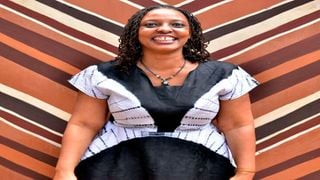
Dr Mshai Mwangola.
| PoolWeekend
Premium
Oraturist Mshai Mwangola calls for moving Kenya’s cultural centre
What you need to know:
- How can our culture support and sustain our identity, our unity and our efficiency as a nation?
- What kind of culture can form a viable foundation for a nation?
Moving the Centre is the title of a book by our beloved guru and elder, Ngugi wa Thiong’o. The centre that Ngugi writes about is the main standpoint from which we see and do things. An African should, logically, think and act from an Afrocentric position, relating his or her operations to African experiences and interests.
This relates closely to what Mshai Mwangola is challenging all Kenyans to do in their cultural practices. Dr Mwangola, the eminent performance consultant, governance activist, gender equity advocate and “oraturist” (spoken communication practitioner), as she describes herself, was delivering a keynote address to the first Performing Arts Conference at the Kenya Cultural Centre last Tuesday. She emphatically called on Kenyans to live up, in concrete and demonstrable action, to the assertion in their 2010 Constitution that “Culture is the Foundation of the nation.”
This radical proposition struck me with a particular significance. How can our culture support and sustain our identity, our unity and our efficiency as a nation? This, obviously, begs at least two other questions, to which Dr Mwangola suggested some enlightening approaches. The first question is “what is culture?” The second, more complex one, is “what kind of culture can form a viable foundation for a nation?”
These considerations delighted and excited me because they elucidate and articulate several of my own ruminations about culture, some of which I have shared with you in these columns. Though a performance specialist herself, and speaking at a “performing arts” conference, Dr Mwangola was clear in pointing out that culture is much more than the performing and decorative arts, and “performance” goes way beyond showbiz and what we see on screens and theatre stages.
By calling her address “Performing Culture as the Foundation of the Nation”, she implies that performance also means fulfilling the requirements of an assignment. Culture itself is an assignment, at which we have to perform to required standards. You remember, for example, my Goan friend who was given a job at the Treasury, because “Goans do not steal”. That is, or was, their culture, and the assumption was that they “performed” it, or lived up to it.
Cultural awareness
Let us reflect briefly on how we can adapt our cultural awareness and practices to Dr Mwangola’s challenge and contribute in our small ways to the foundations of our nationhood. The conference at which Dr Mwangola spoke is part of the Platinum (70-plus) Jubilee celebrations of the Kenya Cultural Centre. The Centre, situated between the UoN Main Campus and the Kenya Broadcasting Corporation main studios on Harry Thuku Road, also incorporates the Kenya National Theatre. It was set up by the British in the years between the end of the Second World War and Kenyan independence.
The main problem with the colonial brand of culture was that it was mostly a leisure and luxury preserve of the rulers and the privileged. The kind of culture that Ngugi, Mshai Mwangola and I want to see, I think, is an inclusive and essential commodity for every member of our society. Dr Mwangola suggests that the 2010 Constitution makers’ identification of culture as the foundation of the nation made Kenya a global leader in both cultural and governance thinking.
She notes, however, that for culture to operate as this foundation, “it has to be a principal concern in discourses of human security or peace”. This takes me to my teacher Taban lo Liyong’s all-inclusive definition of culture as “a people’s way of life”. Culture is thus a fulltime and all-round life equipment that guides you through each and every situation.
Whether at sports, worship, dinner party or a political rally, a cultured or “civilised” person should know what to do and how to do it. In politics, for example, if our culture specifies that your rival or opponent is not your “enemy”, and differences of opinion or belief should never lead to violence, the fears and anxieties that assail many of us from time to time should not arise. Similarly, if our culture underlines respect for the environment, we would not pollute it with evils like noise, whether in the name of prayer, preaching, entertainment or advertisement.
This brings us to the kind of culture that can build a national foundation. Three concepts come to mind here. The first is heterogenic state, the second is pluralism and the third is cultural engineering. I believe that a reasonable grasp of these concepts can help us tackle Dr Mwangola’s challenge of actualising culture as a foundation for the nation.
Cultural attitudes
Heterogeneity reminds us that the Kenyan nation, comprises a wide assortment of entities and identities, from Lokitaung to Lungalunga, from Burra to Budalangi, and everything else in between. Regardless of the historical forces that have included us in the space called Kenya, we are all wananchi, raia, members of this nation-society. We must acknowledge and manage the challenges, and opportunities, posed by this situation.
Pluralism is, indeed, the conscious and active process of accepting and managing this rich variety of our ways of living, our culture. We have to be open-minded about our neighbours’ ways of life, even if we do not adopt them, although I think adopting and adapting is the best way of developing and enriching any culture.
At a national level, systematic adopting and adapting of cultural attitudes and practices is what we might call cultural engineering. It is a necessary process in the development of a new society. If we are going to have cultural traits and practices that cut across our diversity, we must deliberately identify them, refine them and propagate them to all our citizens as essentially Kenyan cultural markers.
This is already happening both informally and formally, as in the educational system. We can claim, for example, that Kiswahili is the national language of all Kenyans. Institutions like the Kenya Cultural Centre, if properly empowered and facilitated, can play a vital role in this process.
Dr Mshai Mwangola has thrown down the challenge to us. It is up to us to pick it up.
Prof Bukenya is a leading East African scholar of English and [email protected]





